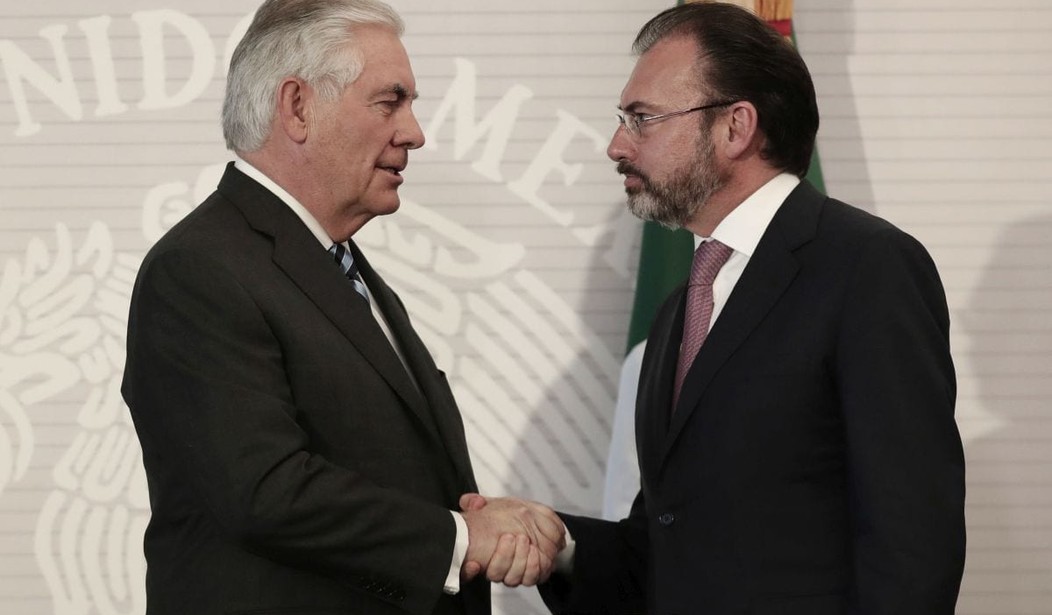The Mexican government made it clear prior to the arrival of U.S. Secretary of State Rex Tillerson and Homeland Security Secretary John Kelly that they would not cooperate with the United States in implementing its new immigration policies.
Secretary Kelly signed off on new immigration enforcement policies on Monday that will allow the immediate deportation to Mexico of illegal aliens caught at the border and give ICE agents broad authority to deport illegals from the interior of the U.S.
But at the same time that the Mexican government was denouncing the policy, they were nevertheless preparing for what is expected to be a massive influx of Mexicans and others into the country who have been deported.
“I want to say clearly and emphatically that the government of Mexico and the Mexican people do not have to accept provisions that one government unilaterally wants to impose on the other,” Mexican Foreign Minister Luis Videgaray told reporters in Mexico City, just ahead of meetings with Mr. Kelly and Secretary of State Rex W. Tillerson.
“We will not accept it, because there’s no reason why we should, and because it is not in the interests of Mexico,” he said, according to the Reuters news agency.
Even as Mexican officials talked tough, they prepared for what could be a massive influx of Mexicans who are either kicked out of the country or flee the U.S.
The Social Development Ministry has for years had a program that organized Mexicans who lived and worked outside their country and helped the communities left behind. Officials said Wednesday that they would work on reforms to “Programa 3 x 1 para Migrantes,” as it’s known, to prepare for the return of many of those migrants.
Mexico used to account for the vast majority of illegal immigrants entering the U.S., but that has tapered off as the Mexican economy has improved and as American officials began to impose stiffer consequences on migrants, raising the risks associated with trying to sneak in.
Now, the bigger problem is a surge of non-Mexicans from the Western Hemisphere who enter Mexico then travel north to reach the U.S.
Mexico’s role in facilitating their journey has long been a source of controversy between the two countries.
Last year, American officials pointed to a surge in Haitians, thousands of whom had been living in Brazil and Chile but started heading north, saying they were enticed by lax Obama administration policies.
Mexico was stopping the migrants at its southern border, then giving them temporary transit visas that lasted just long enough for them to make their way to the U.S. border, where they attempted to enter.
I would say that Mexico doesn’t have to accept anything from the U.S., but what are they going to do? Turn away their own citizens at the border who have been deported?
The Mexican foreign minister ominously added, “We also have control of our borders and we will exercise it fully.” One can imagine a stand-off of some kind at the border where Mexico tries to prevent the deportation of its citizens or refuses to accept citizens from other countries in Central and South America. After decades of eagerly encouraging its citizens to illegally enter the U.S. and facilitating the illegal entry of millions of others, Mexico is about to reap what it has sown.
Videgaray also said that Mexico was prepared to go the United Nations “to defend the freedoms and rights of Mexicans under international law.” Is he really going to stand before the UN and assert that a nation does not have the right to enforce its own immigration laws and deport those who enter illegally?
Good luck with that.
Apparently, there is going to be a lot of bluster from the Mexican government, but in the end, they will have to make arrangements to care for the flood of deported citizens, as well as those from other Central American countries.










Join the conversation as a VIP Member